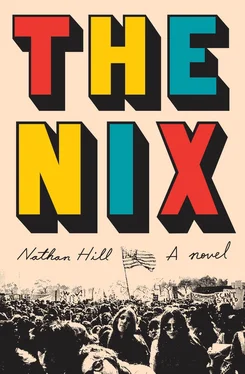The lawyer sat and drummed his fingers on his briefcase. “On to part two!” he said. He turned on the microphone. “Our new subject, sir, is why your mother is an excellent human being with regards to why she shouldn’t go to prison for upward of twenty years.”
“That’s not really a possibility, right?”
“I believe not, sir, but I’d like to cover all my bases, obviously. Now, would you like to hear about your mother’s charitable giving?”
“I’m sort of more interested in what she’s been up to these last couple decades.”
“The public schools, sir. She’s doing some really excellent work in the public schools. Plus poetry? A real advocate for the arts, let me tell you.”
“This part is going to be tricky for me,” Samuel said. “This whole ‘excellent human being’ part, no offense.”
“And why is that, sir?”
“Well, what am I going to tell the judge? That she’s a great person? A wonderful mother?”
The lawyer smiled. “That’s right. Exactly that.”
“I don’t think that’s something I could truthfully say.”
“And why not?”
Samuel looked from the lawyer to his mother and back again. “Seriously?”
The lawyer nodded, still smiling.
“My mother abandoned me when I was eleven!”
“Yes, sir, and as you can probably imagine it’s best that as little of that information about that part of her life reach the public as possible.”
“She abandoned me without any warning.”
“Perhaps, sir, for our purposes, sir, you shouldn’t think of it as your mother abandoned you. Instead, perhaps think of it as she gave you up for adoption slightly later than usual.”
The lawyer opened his briefcase and produced a pamphlet. “Your mother actually did a lot more legwork than most birth mothers do,” he said, “in terms of looking into prospective adoptee families and ensuring her child landed in a positive environment and such. From a certain standpoint, I’d say her diligence in this matter could be considered above and beyond.”
He handed Samuel the pamphlet. The cover was bright pink with pictures of smiling multicultural families and the words So You’re Adopted! at the top in bubbly type.
“I wasn’t adopted,” Samuel said.
“Not literally, sir.”
The lawyer was sweating again, a shiny film on his skin like what you might find on the ground on a dewy morning. A smear of liquid had now also appeared under his armpit and down his sleeve. It looked like his shirt was being swallowed slowly by a jellyfish.
Samuel looked at his mother, who gave him a sort of shrug like What are you going to do? Behind her, out the bank of windows looking north, was the great gray face of the Sears Tower, hazy in the smoggy distance. It used to be the tallest building in the world, but it no longer was. It wasn’t even in the top five. Come to think of it, it wasn’t even called the Sears Tower anymore.
“It’s quiet in here,” Samuel said.
His mother frowned. “What?”
“No traffic noise, no people noise. It’s very isolated.”
“Oh. They were renovating the building when the housing market collapsed,” she said. “They had only done a couple of units when they just left it, unfinished.”
“So you’re the only one in the building?”
“There’s a married couple two floors up. Bohemian artist types. We mostly ignore each other.”
“Sounds lonely.”
She studied his face for a moment. “It suits me,” she said.
“You know, I’d done a pretty good job forgetting about you,” Samuel said. “Until these recent events.”
“Is that so?”
“Yeah. I’d say you were pretty much forgotten, until this week.”
She smiled and looked at the tabletop in front of her — a sort of inward smile that suggested some private thought now occurring to her. She swept the table with her palms, as if she were cleaning it.
“What we think of as forgetting really isn’t,” she said. “Not strictly speaking. We never actually forget things. We only lose the path back to them.”
“What are you talking about?”
“I read this thing recently,” she said. “There was this study about how memory works. This team of physiologists, molecular biologists, neurologists, they were trying to figure out where we keep our memories. I think it was in Nature. Or Neuron. Or JAMA. ”
“A little light reading?”
“I have many interests. Anyway, what they discovered is that our memories are tangible, physical things. Like, you can actually see the cell where each memory is stored. The way it works is, first, you have a perfectly pristine, untouched cell. Then that cell is zapped and gets all deformed and mangled. And that mutilation is, itself, the memory. It never really goes away.”
“Fascinating,” Samuel said.
“I’m pretty sure it was in Nature, now that I think about it.”
“You’re serious?” Samuel said. “I’m baring my soul here and you’re talking about a study you read about?”
“I liked the metaphor,” Faye said. “And besides, you weren’t baring your soul. Not even close, not yet.”
The lawyer cleared his throat. “Perhaps we should return to our topic?” he said. “Professor Anderson, sir? If you’d like to begin your direct examination?”
Samuel stood up. He paced one way, then another. There was a single small bookcase along the wall, and this is where he went. He could feel his mother’s eyes boring into his back as he inspected the shelves: mostly poetry, a large collection of Allen Ginsberg. Samuel realized that what he was really looking for was a copy of the famous magazine his story was published in. He realized this when he felt disappointed not to see it.
He spun around. “Here’s what I’d like to know.”
“Sir?” the lawyer said. “You’re out of microphone range?”
“I’d like to know what you’ve been doing these twenty years. And where you went when you left us.”
“That, sir, is probably outside the scope of our inquiry.”
“And all this business about you in the sixties. Getting arrested. What they’re saying about you on TV—”
“You want to know if it’s all true,” Faye said.
“Yes.”
“Was I a radical? Was I in the protest movement?”
“Yes.”
“Was I arrested for prostitution?”
“Yes. There’s about a month of 1968 unaccounted for. I had always thought you were in Iowa, at home, with Grandpa Frank, waiting for Dad to come back from the army. But you weren’t.”
“No.”
“You were in Chicago.”
“For a very short time, yes. Then I left.”
“I want to know what happened.”
“Hah-hah!” the lawyer said, and did a little drumroll on his briefcase. “I think we’ve traveled slightly far afield, yes? Now perhaps we could get back to our subject?”
“But you have other questions, right?” Faye said. “Even bigger questions?”
“We could get to those. In time,” Samuel said.
“Why wait? Let’s get it all out in the open right now. Go on and ask me. There’s only one real question.”
“We could begin with the photograph. The photo taken of you at that protest, in 1968.”
“But that’s not why you’re here. Ask your real question. The thing you came here to find out.”
“I came here to write a letter to the judge.”
“You did not. Go ahead. Ask your question.”
“It’s not relevant.”
“Just ask. Do it.”
“It’s not important. It’s nothing—”
“I’d agree with that!” the lawyer cut in. “Immaterial.”
“Shut up, Simon,” Faye said, then leveled her eyes at Samuel. “This question is everything. It’s why you’re here. Now why don’t you stop lying and ask it.”
Читать дальше












